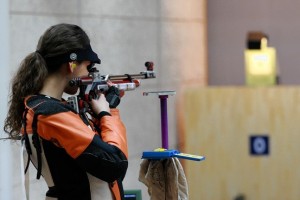I love the Olympics. I love watching all the events. I love watching the "fluff" (background pieces/sob stories about the athletes). And I love seeing amazing athletes who participate in sports that don't often get a lot of attention (like synchronized swimming and fencing, for example). And then there's shooting.
 Over the weekend six shooters were selected for the US Olympic Team. One of them, Sarah Scherer, was featured in a thought-provoking and informative Wall Street Journal article last week. Scherer is a junior at Texas Christian University on an all-female team that won the NCAA Championship last year. That would be the rifle championship for men and women. Shooting is one sport where women are now consistently beating men. As the WSJ piece explains this is not possible in other sports due to physiological differences between men and women (in shooting women in fact may have the physical advantage, with a lower center of gravity and better balance). Despite this there are separate competitions for men and women in the Olympics, as there are for many other events (exceptions include sailing and the equestrian events). Interestingly, until 1976 women and men did compete against one another in shooting, but that changed after pressure from Eastern Europe to segregate the sport (I assume for more medal opportunities, but the article wasn't clear on this point). Giving more people more opportunities to win Olympic medals is okay with me, but I hope it's not because of implicit sexism that this is true.
Over the weekend six shooters were selected for the US Olympic Team. One of them, Sarah Scherer, was featured in a thought-provoking and informative Wall Street Journal article last week. Scherer is a junior at Texas Christian University on an all-female team that won the NCAA Championship last year. That would be the rifle championship for men and women. Shooting is one sport where women are now consistently beating men. As the WSJ piece explains this is not possible in other sports due to physiological differences between men and women (in shooting women in fact may have the physical advantage, with a lower center of gravity and better balance). Despite this there are separate competitions for men and women in the Olympics, as there are for many other events (exceptions include sailing and the equestrian events). Interestingly, until 1976 women and men did compete against one another in shooting, but that changed after pressure from Eastern Europe to segregate the sport (I assume for more medal opportunities, but the article wasn't clear on this point). Giving more people more opportunities to win Olympic medals is okay with me, but I hope it's not because of implicit sexism that this is true.
Co-ed sports competitions bring their own problems, of course. As I've written about before, here in Massachusetts there have been controversies over boys playing on girls' field hockey teams and swim teams. The swim team issue is especially thorny because boys can now break girls' swim records. Early last month the state's high school athletic association formed a subcommittee to investigate the issue and they will issue a report in early April, which I'll write about here in the spring. From the coverage I've read it seems people want separate male and female records, which makes sense. I just hope they don't go the way of the IAAF and decide that women's records only apply in women's-only events (if men push women to race faster then so be it).
Records are also at issue in downhill skiing, where a rather interesting controversy erupted last month over underwear. Slovenian ski racer Tina Maze was accused of wearing illegal underwear. Yes, you read that properly. The Swiss Federation complained that her undergarments had too much plastic, giving her an unfair advantage (just how they saw her drawers was not revealed). Maze had no problem revealing her own skivvies on the Internet, posting this picture on her Facebook page:
 In skiing, as in swimming, plastic garments give athletes an edge by making them more aerodynamic. In skiing that means less wind resistance. While Maze's unmentionables were cleared by the International Ski Federation (FIS), FIS took the opportunity to say that plastic underwear may be harmful to skiers' health. (To me skiing down icy slopes at breakneck speeds is far more hazardous to one's health than wearing plastic underwear, but clearly I'm not a skier!) I can only hope that the comments applied to male and female skiers equally and that the Federation wasn't more concerned about women's underwear than men's...
In skiing, as in swimming, plastic garments give athletes an edge by making them more aerodynamic. In skiing that means less wind resistance. While Maze's unmentionables were cleared by the International Ski Federation (FIS), FIS took the opportunity to say that plastic underwear may be harmful to skiers' health. (To me skiing down icy slopes at breakneck speeds is far more hazardous to one's health than wearing plastic underwear, but clearly I'm not a skier!) I can only hope that the comments applied to male and female skiers equally and that the Federation wasn't more concerned about women's underwear than men's...
One Olympic sport where men and women seem to be getting equal top-notch attention is volleyball. I loved reading this article about Hugh McCutcheon. You may recall from the 2008 Olympics that McCutcheon's father-in-law and wife were stabbed during the Games (his father-in-law died from his injuries). But McCutcheon returned to coach the men's volleyball team to a gold medal, the first in 20 years. Now he's taken over as head coach of the WOMEN'S volleyball team for the 2012 Games. I love that he sees male and female athletes as equally worthy.
Perhaps next Olympic cycle we'll get a coach switching from the female to the male side-- or is that too much to hope for?